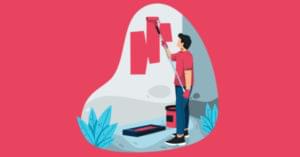
Bill Gates has changed the world.
He’s built a Fortune 100 company. Everyday people use his software to create, to work, to grow their business.
But millions of people hate him.
They hate the way he does business, the way he approaches problems. He’s hated for his lack of social grace, his pettiness and his faults, he’s slandered online and humiliated publicly.
All Because He’s the Best
Bill Gates and Paul Allen wrote a BASIC language interpreter in assembly language. He did this for a computer he didn’t have that had only 4,000 bytes of memory. In the early days, Gates proved he knew how to code.
But the best?
Steve Wozniak wrote basic for the original Apple from scratch.
Okay, so that means Woz is the best, right?
If you haven’t noticed, being the “best” is pretty subjective. The word “best” doesn’t tell you much about Gates or Wozniak on its own.
- What does being the best mean in their case?
- Why are they the best?
- Who decided they’re the best?
- How did they become the best?
Web developers are in the same boat. Most developers are competitive by nature. There’s this jockeying for position as they try to one up each other.
Someone has to be the best.
Observant developers are probably wondering what “best” means. Some developers begin making assumptions.
- “I’m the best back end developer at my company”
- “I’m the best JavaScript developer here”
- “I’m the best debugger on my team”
Being the “best” is a moving target. When it’s missing context it stops being useful. But make no mistake, being the best matters. It matters a whole lot.
Why?
Being the best at something gives you a certain amount of uniqueness. It gives you more credibility than those around you. It gives you shelf space in the hearts and minds of those around you.
That shelf space gives you power.
If you’re a rockstar JavaScript developer and a JavaScript problem crops up, you’re the one everyone turns to. That’s important because it gives you uniqueness.
Being the Best Comes with Unexpected Downsides
Linus Torvalds hates Nvidia, calling them “the single worst company” the Linux community has ever dealt with.
See for yourself.
[youtube iYWzMvlj2RQ]
Okay, maybe he’s had a bad experience with them. Maybe he’s a respectful guy, aside from this experience.
- Defends his right to humiliate and shame Linux kernel developers.
- Stated he wouldn’t change Linux “to deep-throat Microsoft”
- Says a code of conduct stating people should be ‘respectful’ and ‘polite’ is just so much crap and bullshit”
- “I’m not a nice person and I don’t care about you” when asked about his attitude.
Oh boy.
Your Android phone is only possible because of him. Torvalds is a genius. He’s brilliant.
He’s also the best at what he does. And that’s convinced him that he has the right to crush people, to shame and humiliate others.
Most People Don’t Behave the Way Linus Does
It’s true, but not because they’re altruistic. The vast majority of people, developers included, are kind.
But most people are average.
Most people don’t believe they’re average. Suggest that they are and you’ve suddenly made an enemy. Are most people’s assessment of their own qualities and abilities accurate?
Sadly, no.
Most people suffer from illusory superiority, a cognitive bias where individuals overestimate their abilities, skills, qualities.
Those who aren’t average know they stand out, and that’s where the problem starts.
Still not convinced?
- Steve Jobs scammed Steve Wozniak, lying about the size of the bonus they received from game maker Atari. Jobs gave Woz $350, pocketing $5,000 for himself.
- Mark Zuckerberg admitted sending IMs where he wrote “I’m going to fuck them,” when collaborating with partners on a Facebook-like website. He also referred to users as “dumb fucks.”
- Bill Gates watered down Paul Allen’s stake in Microsoft, not once but twice, later scheming with then-CEO Steve Ballmer about ways to dilute his co-founder’s ownership even further — right as Allen was being treated for cancer.
- Twitter co-founders stabbed each other in the back. Evan Williams, back-channeling with the Twitter board, fired his co-founder Jack Dorsey. Williams was the visionary behind Blogger. He hired a development team, and told them in 2001 that he couldn’t pay them anymore. Then he cashed out in 2003 when Google bought Blogger, cutting his team out in the end.
Starting to see a pattern?
This isn’t just a tech or entrepreneur thing. It’s a people thing and developers aren’t immune.
Being the Best Makes You a Victim
But it’s something you should absolutely pursue. There’s a secret most developers miss when they realize they’re the best.
This secret will, if ignored, cost you your job.
Catch it in time and being the best becomes an incredible advantage. Okay, so what’s the secret? What’s going to cost me my job and possibly end my career?
Power is loaned and must be repaid.
When you’re exceptional, the best at something, you have power. That power can be used for all kinds of things — special favors, incentives and bonuses, preferential treatment, you name it.
And there’s nothing wrong with that.
Here’s the huge mistake exceptional people make. They believe that power comes from them, that it’s an intrinsic part of who they are. They believe they have power because they’re awesome. That their power gives them absolute leverage.
- Beautiful women use their looks to get what they want.
- Celebrities use their influence to win lucrative endorsement deals.
- And famous developers receive more money, power and influence than their co-workers.
See the problem? No?
When the exceptional, the best in any field misbehave, they’re making a significant statement. They believe the power they have comes from them.
It doesn’t.
It comes from those around them.
That power is given to the exceptional so they can continue to serve. Linus Torvalds is expected to use his power to guide and serve the community. When you’re the best on your team you’re given that power to serve. If you consistently fail to serve those around you your power, status, influence, prestige — is revoked.
Your status, power and influence is, at its core, about trust.
Your teammates trust you to behave in a way that will benefit them and care for their interests. They trust you to do that and they give you power to be able to do that. For them.
How?
- Co-workers come to you for advice
- Managers give you rewards, incentives and bonuses
- Your team trusts you to lead (and they follow)
- You’re asked to represent the team or the company officially
Power is loaned and must be repaid. How, you ask?
- Helping your team fight off or outperform competitors.
- Attract attention and notoriety for your project, app, team, etc.
- Building, teaching, developing your team. Making them better.
- Achieving results that are above and beyond what the average co-worker can achieve.
Long story short, you’re expected to get results for your team.
But It’s Not Just the Results That Matter
It’s how you get them.
Are you kind and respectful? Are you a decent and honorable person or do you behave like a certified asshole?
It’s easy to act as if these details don’t matter. That they’re soft skills, touchy-feely nonsense that only matters to the weak. Nothing could be further from the truth.
Being the best comes with one responsibility.
Make things better for others.
- Better for newcomers.
- Better for the industry.
- Better for your co-workers.
- Better for your employer.
Ignore this truism, and eventually it’ll cost you your job. Those around you will revoke the power they gave you — they’ll fire you, stop listening, quit their jobs to get away from you, etc.
The Best Don’t Lose Their Jobs
We’re all familiar with horrible co-workers, horrible bosses. The exceptional people who feel it’s their right to use and abuse those they work with.
It feels like they’ll continue to get away with bad behavior. As long as they continue to get results they’ll get away with anything and everything. Look closer and you’ll see there’s a cost.
- Bill Gates worked hard to undo the hate, but he’s still disliked by many.
- Linus Torvalds’s horrible reputation costs him opportunities.
- Steve Jobs was fired from his own company.
- Mark Zuckerberg continues to be haunted by his bad behavior and the choices he made in his past.
Doesn’t that mean being the best isn’t the problem?
That, maybe, it’s about being a jerk?
You know the truth. If you’re a great person but you’re mediocre or simply average, you don’t get the same benefits and rewards as those who are the best at what they do. A nice guy who’s just average doesn’t get status, power, prestige or influence. An exceptional person who’s dishonorable eventually loses his power when it’s revoked or permanently blunted.
When you make things better for others you’re focused on the outcome and the experience. Does being the best JavaScript or back-end developer matter if no one will work with you? Lift others up, make them better and you’ll truly be the best. The vast majority of your co-workers will see you as you are — exceptional.
Being the Best Isn’t Enough
Bill Gates built the world’s largest personal computer software company. He fought to eradicate poverty and disease.
But he still receives a disproportionate amount of hate.
Being the best is subjective when it’s self-serving. When you’re actually best, you make those around you better. When you’re truly exceptional your skills, character and attitude align, forming the complete package.
And how will you know you’re the best?
When those around you give you the status, influence and power you need to serve. Because someone has to be the best.
It might as well be you.
 Andrew McDermott
Andrew McDermottAndrew McDermott is the co-founder of HooktoWin and the co-author of Hook: Why Websites Fail to Make Money. He shows developers and designers how to attract and win new customers.






